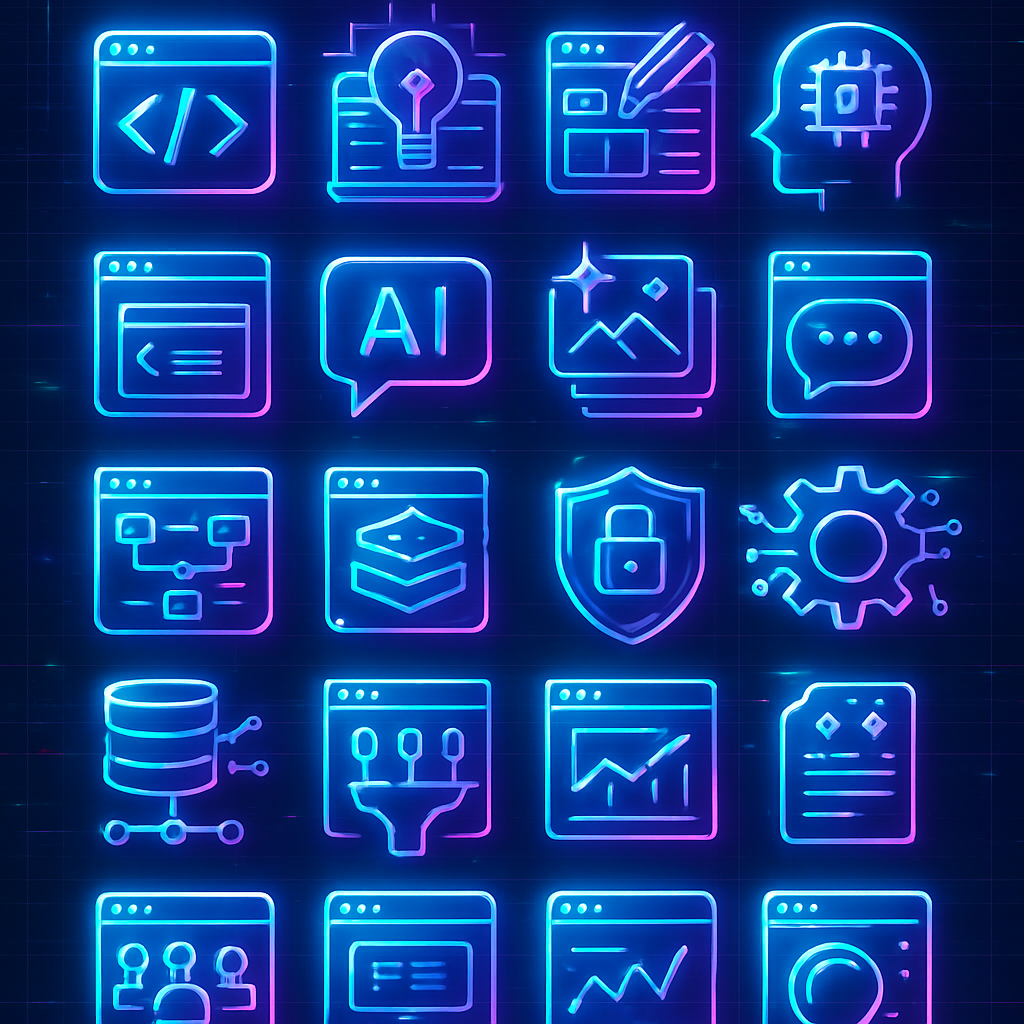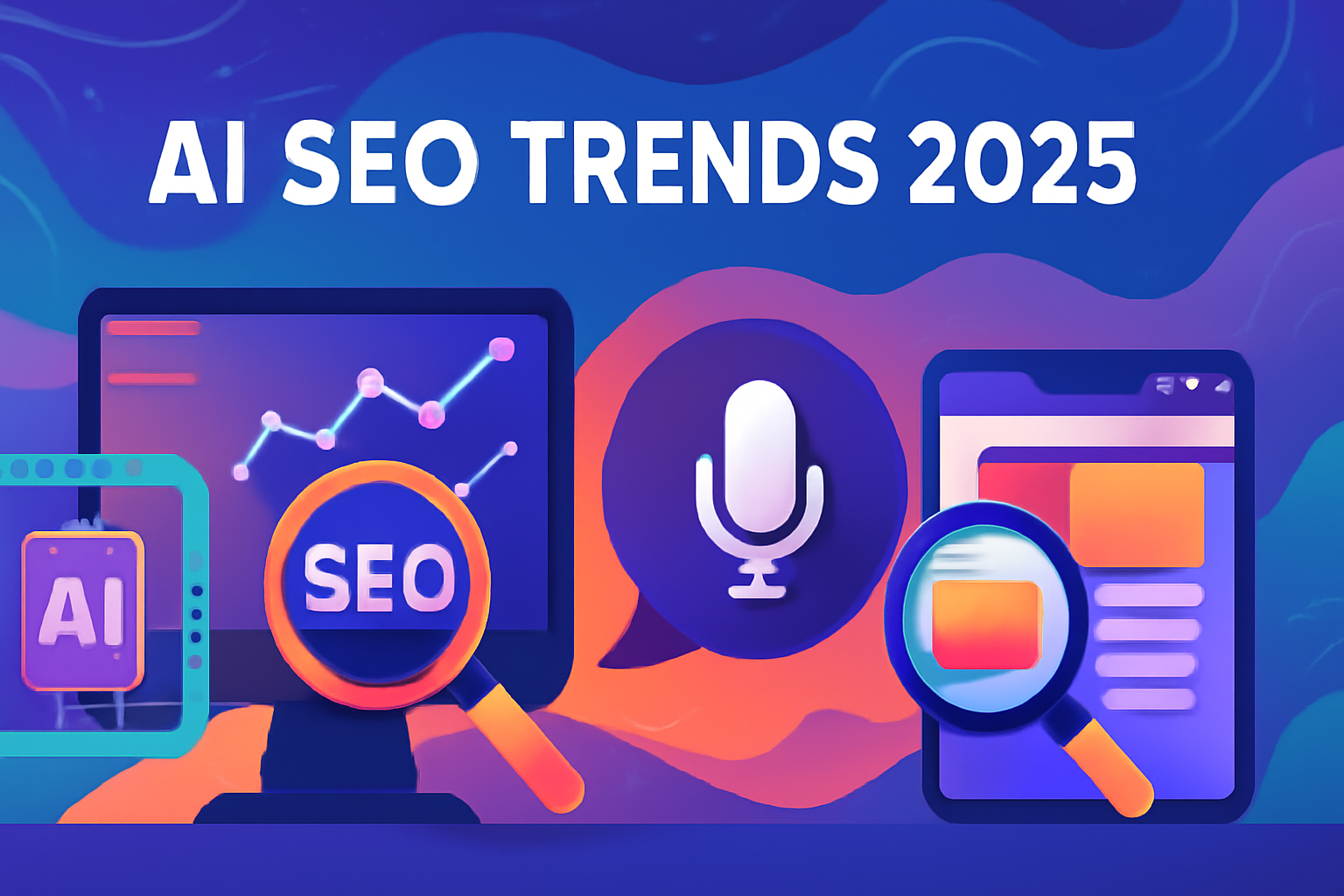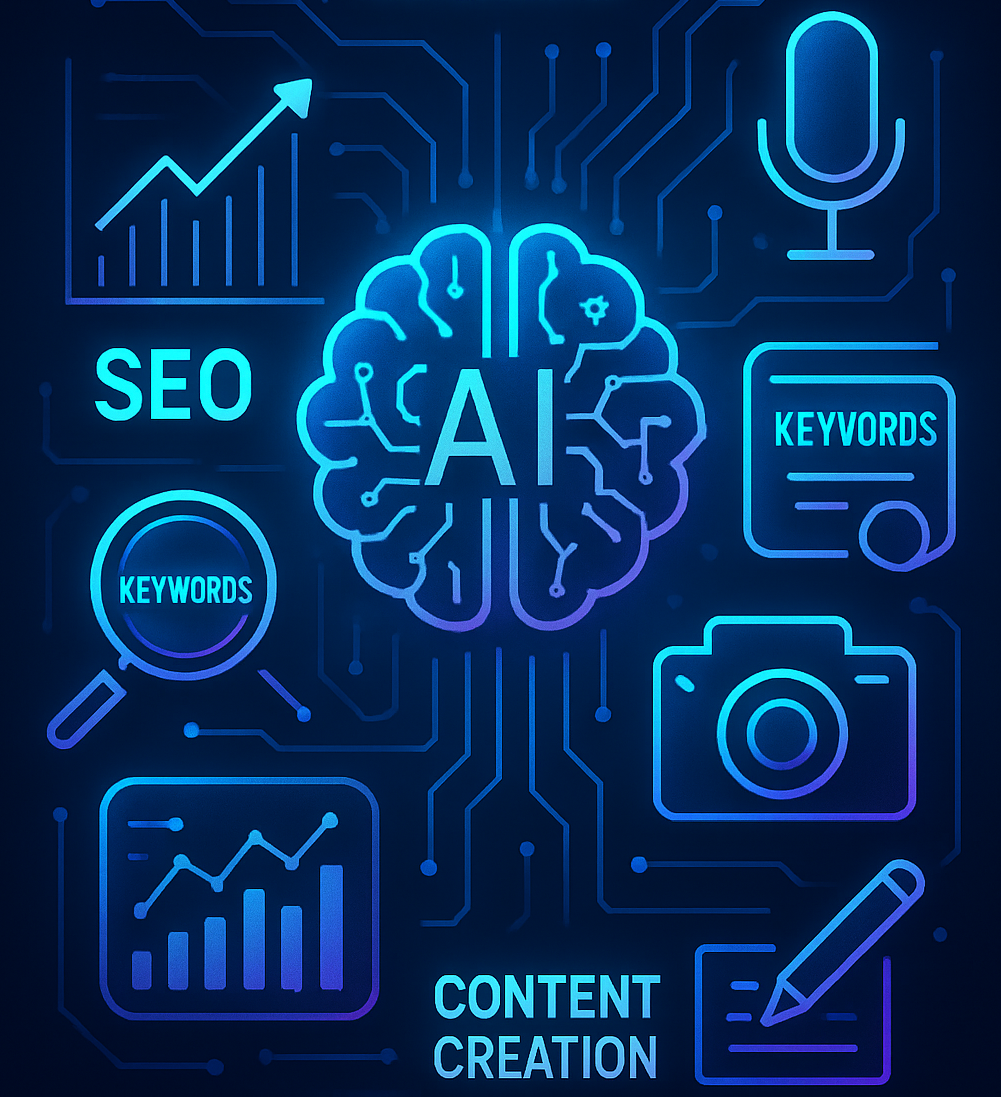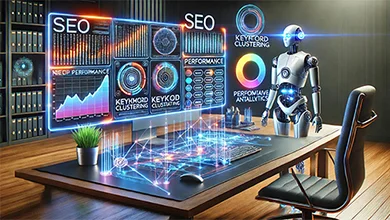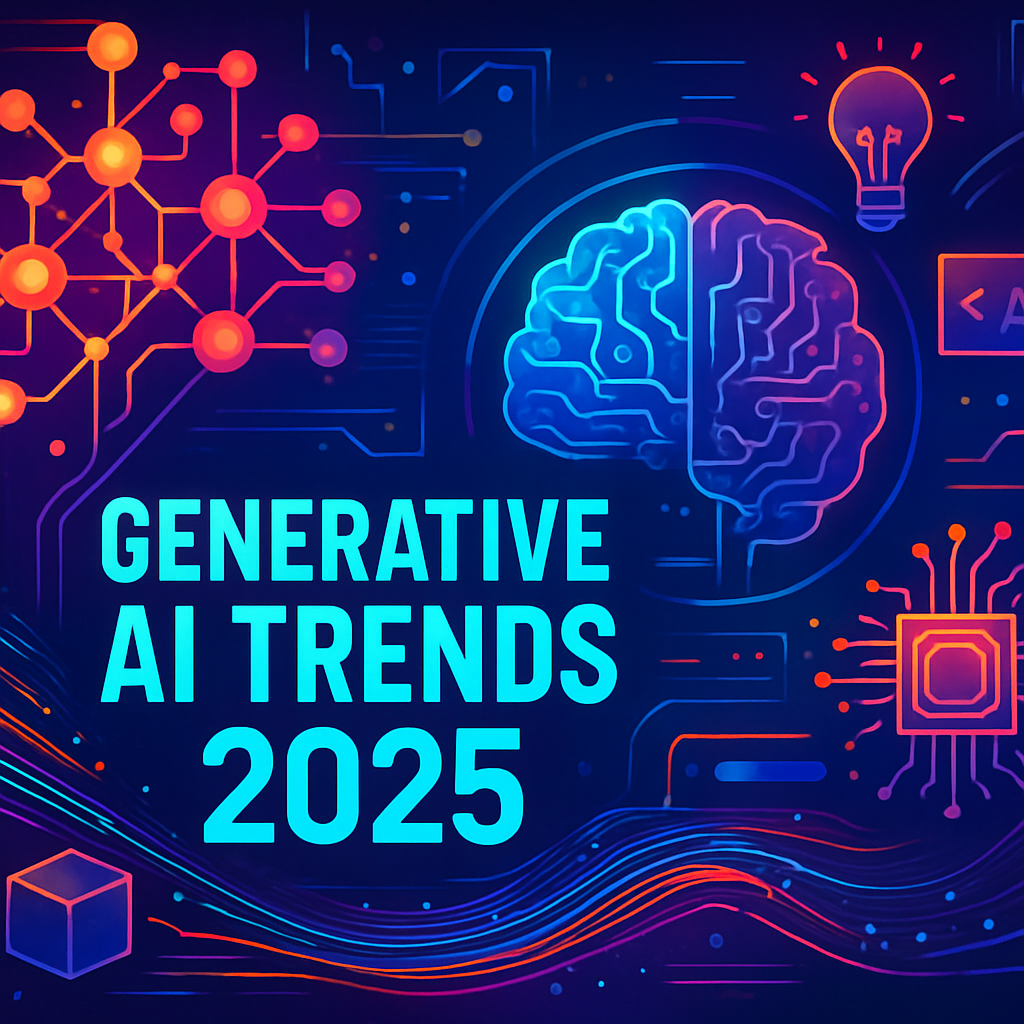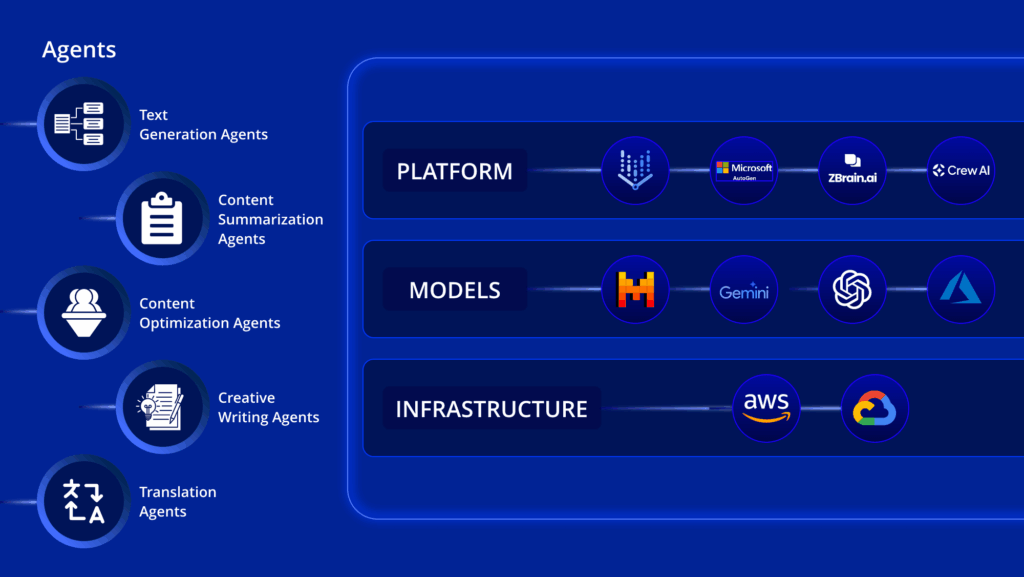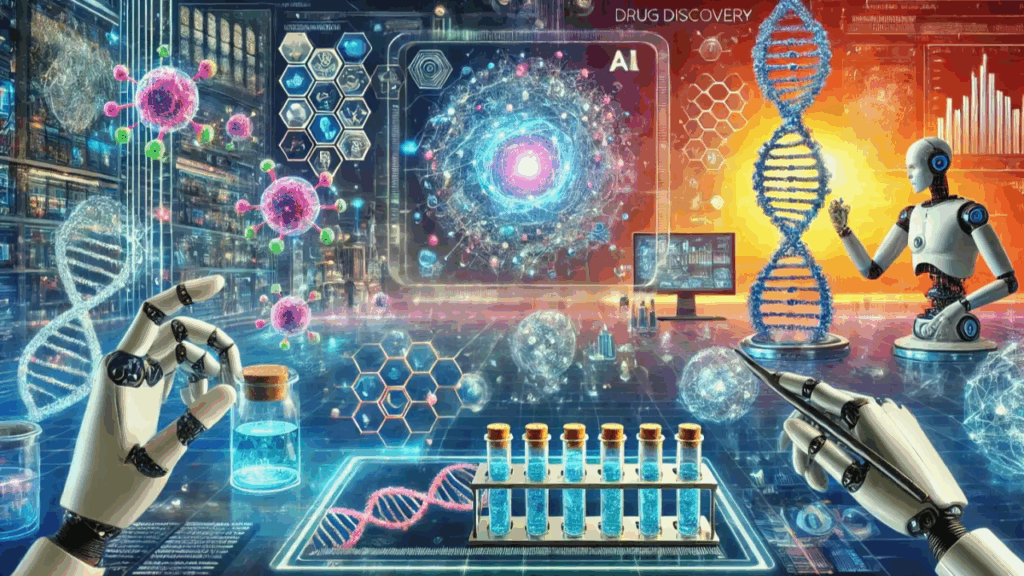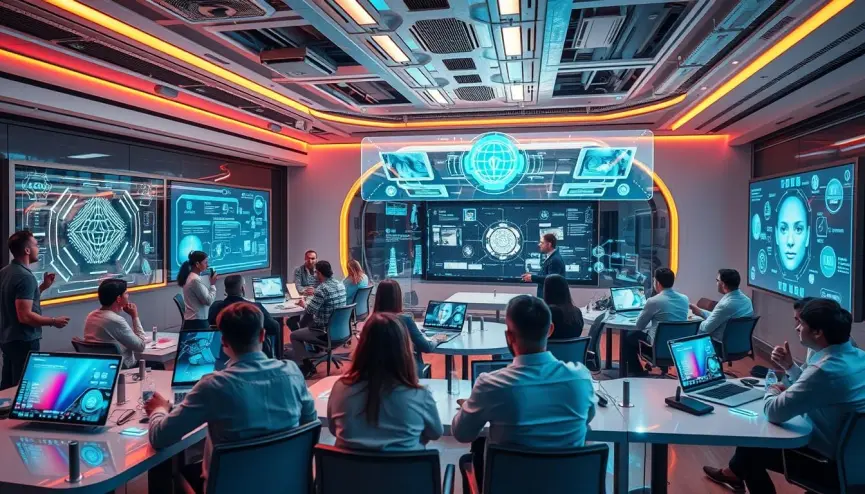Guide to AI Website Platforms 2025
Meta Description: Discover the best guide to AI website platforms 2025. From Wix ADI to Builder.ai, explore 20 powerful AI website builders that’ll revolutionize your web development process.
You’re staring at a blank screen, cursor blinking mockingly at you. The client wants a website yesterday, and you’re wondering if you’ve got enough coffee to pull another all-nighter. Sound familiar?
Well, I’ve got news for you – those days of wrestling with code until 3 AM might be numbered. AI website platforms are here, and they’re not just changing the game; they’re flipping the entire chessboard.
As someone who’s watched web development evolve from the dark ages of table-based layouts to today’s sophisticated frameworks, I can tell you this: we’re witnessing something revolutionary. These AI-powered tools aren’t just fancy marketing gimmicks – they’re genuinely transforming how we approach AI website creation.
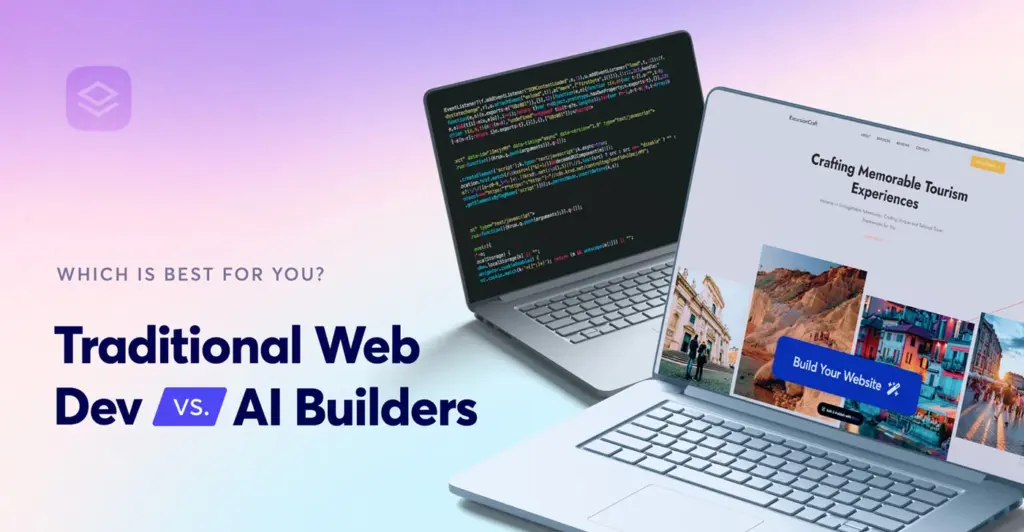
What Exactly Is an AI Website Platform?
Before we dive into the treasure trove of tools that’ll make your life easier, let’s get our bearings straight. An AI website platform is essentially your digital Swiss Army knife – a comprehensive solution that uses artificial intelligence to automate, optimize, and accelerate the website building process.
Think of it as having a brilliant design partner who never sleeps, never argues about color choices, and somehow always knows exactly what your users want. These platforms leverage machine learning algorithms to analyze your content, understand your brand, and generate websites that look like they took weeks to build – except they’re ready in minutes.
The magic happens through AI website automation that handles everything from layout selection to content optimization. It’s like having a team of designers, developers, and UX experts all rolled into one incredibly efficient digital assistant.
How Do These AI Website Platforms Actually Work?
Here’s where things get interesting. Most AI website builders follow a surprisingly elegant process:
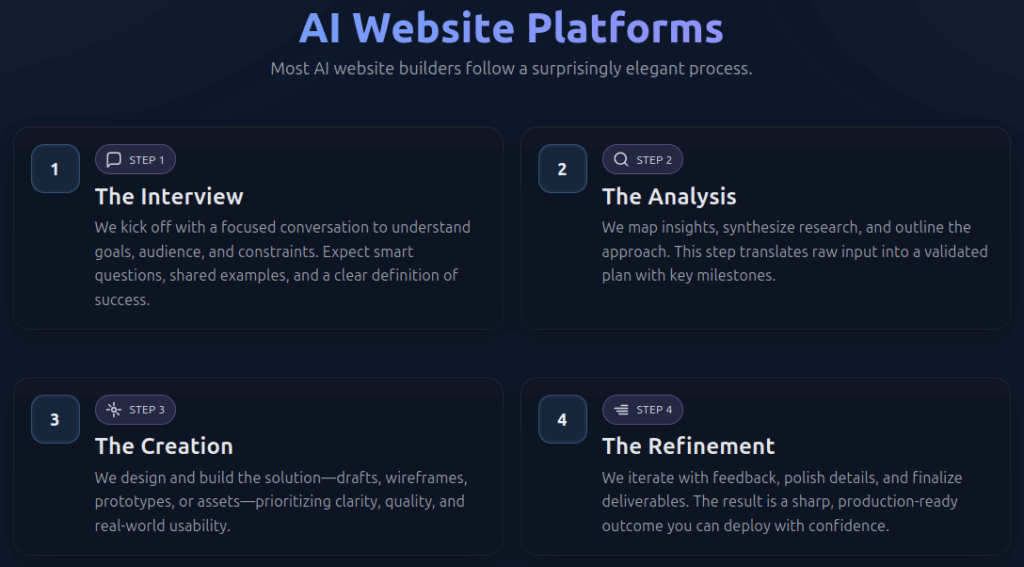
Step 1: The Interview The AI asks you questions – not unlike a therapist, but with better intentions for your business. What industry are you in? What’s your style preference? Do you need e-commerce functionality?
Step 2: The Analysis Using your answers, the AI analyzes thousands of successful websites in your niche. It’s like having access to the collective wisdom of the internet’s best designers.
Step 3: The Creation Within minutes, you’ve got a fully functional website. Not a template – a custom creation tailored specifically to your needs.
Step 4: The Refinement Here’s where AI website personalization shines. The platform continues learning from user behavior, making real-time adjustments to improve performance.
Why AI Website Platforms Beat Traditional Website Builders (And It’s Not Even Close)
Let me be brutally honest – I was skeptical too. How could AI possibly replace the nuanced decision-making that goes into good web design? But after testing dozens of these platforms, I’m convinced that for most projects, AI-powered websites offer advantages that traditional builders simply can’t match.
Speed That’ll Make Your Head Spin
Traditional website building: 2-6 weeks AI website platform: 2-6 minutes
I’m not exaggerating. I once built a complete portfolio site during my lunch break using Wix ADI. The client loved it, and I had time left over for dessert.
Intelligence That Learns and Adapts
Unlike static templates, these AI website design tools actually get smarter over time. They analyze which layouts convert better, which color schemes keep visitors engaged longer, and which navigation patterns reduce bounce rates.
Personalization at Scale
Here’s something that blew my mind: modern AI platforms can create different versions of your site for different visitor types. B2B visitor from LinkedIn? They see industry-specific case studies. Consumer from social media? They get lifestyle-focused content.
Do You Need Coding Skills? (Spoiler Alert: Absolutely Not)
This is probably the question I get asked most often, and the answer is refreshingly simple: No coding required. Period.
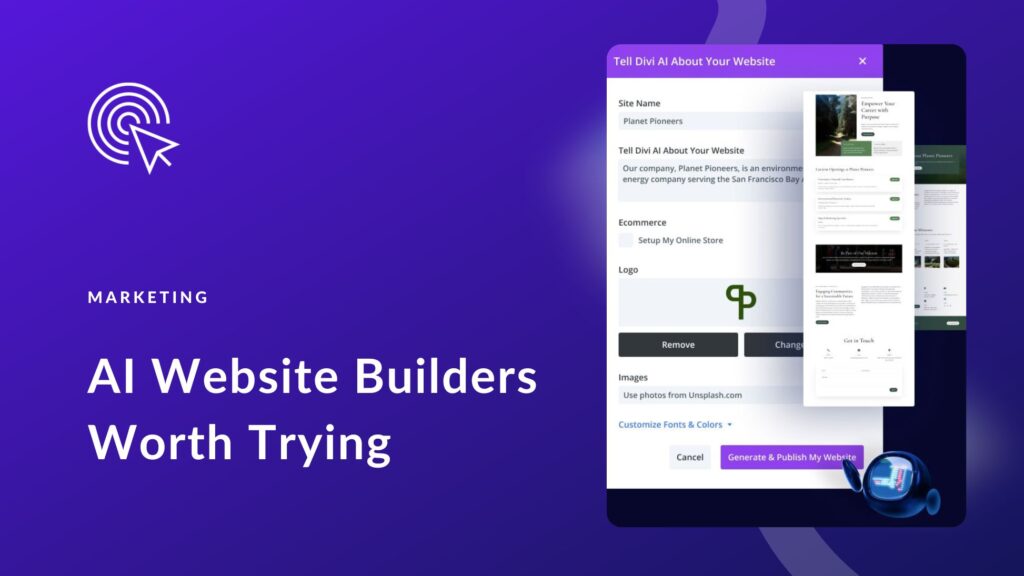
These platforms are designed for humans, not machines. If you can answer questions like “What’s your business about?” and “What colors do you prefer?”, you can build a professional website.
That said, having some technical knowledge doesn’t hurt. It’s like knowing how to cook – you don’t need to be Gordon Ramsay to make a good meal, but understanding the basics helps you appreciate the process and make better decisions.
Customization: How Much Creative Control Do You Really Have?
Here’s where things get nuanced. Early AI website builders were like ordering from a prix fixe menu – limited options, take it or leave it. But today’s AI website development platforms offer surprising flexibility.
Most modern AI builders operate on what I call the “80/20 principle”:
- 80% of the heavy lifting (layout, optimization, technical setup) is handled by AI
- 20% of the creative decisions (branding, specific content, unique features) remain in your hands
This sweet spot gives you professional results without the complexity overload that paralyzes many beginners.
Levels of Customization Available:
| Basic Level | Intermediate Level | Advanced Level |
|---|---|---|
| Color schemes | Custom CSS injection | API integrations |
| Font selection | Layout modifications | Custom databases |
| Image uploads | Third-party widgets | Advanced analytics |
| Text editing | E-commerce setup | Multi-site management |
The Top 20 AI Website Platforms That Are Changing Everything
Alright, let’s get to the good stuff. After testing more platforms than I care to count (my browser bookmark bar is a graveyard of forgotten trials), here are the 20 AI website platforms that actually deliver on their promises.
✅ 1. Wix ADI – The Crowd Pleaser
Wix’s Artificial Design Intelligence is like that friend who always knows the right thing to say. It asks smart questions and delivers websites that feel custom-made. Perfect for small businesses and personal projects.
Best For: Complete beginners who want professional results Standout Feature: Incredibly intuitive question-and-answer setup
✅ 2. Bookmark AiDA – The Speed Demon
If website building were a race, AiDA would leave everyone eating dust. This AI Design Assistant can have your site up and running faster than you can order a pizza.
Best For: Businesses that need to launch quickly Standout Feature: Lightning-fast site generation
✅ 3. Zyro AI Website Builder – The Budget-Friendly Beast
Don’t let the affordable pricing fool you – Zyro packs serious punch. Their AI tools for content generation and heat mapping rival much more expensive platforms.
Best For: Startups watching every penny Standout Feature: AI content writer that actually makes sense
✅ 4. Jimdo Dolphin – The Smooth Operator
Jimdo Dolphin is what happens when German engineering meets AI innovation. Clean, efficient, and surprisingly sophisticated.
Best For: Users who appreciate minimalist design Standout Feature: Seamless mobile optimization
✅ 5. Squarespace AI – The Design Darling
Squarespace has always been the cool kid in the design block. Their AI integration maintains that aesthetic excellence while making everything more accessible.
Best For: Creative professionals and visual-heavy businesses Standout Feature: Templates that look like they belong in a design museum
✅ 6. Weebly by Square AI – The E-commerce Expert
With Square’s payment processing expertise baked in, Weebly’s AI is particularly strong for businesses that want to sell online.
Best For: Small to medium e-commerce businesses Standout Feature: Integrated payment processing
✅ 7. GoDaddy Website Builder – The Small Business Champion
GoDaddy’s AI understands small businesses like nobody else. It’s optimized for local SEO and designed for people who need results, not complexity.
Best For: Local businesses and service providers Standout Feature: Built-in local SEO optimization
✅ 8. Ucraft AI – The Portfolio Perfectionist
If you’re building a portfolio or showcase site, Ucraft’s AI has an almost supernatural understanding of what makes creative work shine online.
Best For: Designers, photographers, and creative professionals Standout Feature: Portfolio-specific optimization
✅ 9. SITE123 AI – The Simplicity Master
Sometimes the best solution is the simplest one. SITE123 proves that AI website software doesn’t need to be complicated to be effective.
Best For: Users who want zero learning curve Standout Feature: Three-step website creation process
✅ 10. Webflow AI – The Designer’s Dream
Webflow bridges the gap between no-code simplicity and professional web design. Their AI features enhance rather than replace creative control.
Best For: Designers who want AI assistance, not replacement Standout Feature: Visual development environment
✅ 11. Duda AI – The Agency Favorite
Built specifically for agencies and web professionals, Duda’s AI streamlines client work without sacrificing customization options.
Best For: Web design agencies and freelancers Standout Feature: Client collaboration tools
✅ 12. Tilda Publishing AI – The Content Creator’s Choice
Tilda’s AI excels at creating content-rich sites. If your website needs to tell a story, Tilda’s tools help craft compelling narratives.
Best For: Publishers, bloggers, and content marketers Standout Feature: Story-driven design blocks
✅ 13. PageCloud AI – The Flexibility Champion
PageCloud gives you the freedom to place elements anywhere on the page while providing AI assistance to ensure everything looks professional.
Best For: Users who want complete design freedom Standout Feature: True drag-and-drop flexibility
✅ 14. Webnode AI – The International Player
With support for multiple languages and currencies, Webnode’s AI understands global business needs.
Best For: International businesses and multi-language sites Standout Feature: Multi-language optimization
✅ 15. Zyro AI Commerce – The E-commerce Specialist
Zyro’s e-commerce focused platform uses AI to optimize product displays, checkout processes, and sales funnels.
Best For: Online stores and product-based businesses Standout Feature: AI-powered sales optimization
✅ 16. Elementor AI – The WordPress Powerhouse
For WordPress users, Elementor’s AI integration brings modern website building capabilities to the world’s most popular CMS.
Best For: WordPress enthusiasts and developers Standout Feature: Seamless WordPress integration
✅ 17. Builder.ai – The App-Website Hybrid
Builder.ai thinks bigger than just websites. Their platform can create web apps and mobile experiences using the same AI-driven approach.
Best For: Businesses needing web and mobile presence Standout Feature: Multi-platform development
✅ 18. Simvoly AI – The Marketing Machine
Simvoly combines website building with funnel creation and e-commerce, all powered by AI that understands marketing psychology.
Best For: Marketing-focused businesses and sales funnels Standout Feature: Integrated marketing tools
✅ 19. Bookmark AI Business – The Professional Package
https://www.bookmark.com/business
Designed specifically for business websites, this platform includes AI-powered SEO tools and analytics that actually help you understand your audience.
Best For: Established businesses wanting data-driven insights Standout Feature: Advanced AI analytics
✅ 20. The Wild Card Pick: Framer AI
While not in the original list, Framer deserves mention for its innovative approach to AI-assisted design and prototyping.
Best For: Designers who want to blur the line between design and development Standout Feature: Real-time collaborative AI design
How Much Will This AI Magic Cost You?
| Platform | Primary Strength | Best For | Price Range | AI Features | Ease of Use |
|---|---|---|---|---|---|
| Wix ADI | User-friendly design | Beginners | $14-$39/month | Smart Q&A, Auto-design | ⭐⭐⭐⭐⭐ |
| Bookmark AiDA | Speed of creation | Quick launches | $11.99 – $24.99/month | Rapid site generation | ⭐⭐⭐⭐⭐ |
| Zyro AI | Affordability + features | Budget-conscious users | $2.90 – $14.90/month | Content generation, heatmaps | ⭐⭐⭐⭐ |
| Jimdo Dolphin | Simplicity | Minimalist design lovers | $9 – $39/month | Smart site building | ⭐⭐⭐⭐⭐ |
| Squarespace AI | Design quality | Creative professionals | $16 – $54/month | Design intelligence | ⭐⭐⭐⭐ |
| Webly AI | E-commerce integration | Online stores | $10 – $26/month | Sales optimization | ⭐⭐⭐⭐ |
| GoDaddy Builder | Local SEO | Small businesses | $10.99 – $21.99/month | Business optimization | ⭐⭐⭐⭐ |
| Ucraft AI | Portfolio creation | Creative Portfolios | $10 – $39/month | Portfolio optimization | ⭐⭐⭐⭐ |
| SITE123 AI | Ultra simplicity | Complete beginners | $12.80 – $22.80/month | 3-step creation | ⭐⭐⭐⭐⭐ |
| Webflow AI | Design control | Professional designers | $14 – $39/month | Visual AI assistance | ⭐⭐⭐ |
| Duda AI | Agency features | Web agencies | $19 – $44/month | Client collaboration | ⭐⭐⭐ |
| Tilda AI | Content creation | Publishers / Bloggers | $10 – $40/month | Story-driven blocks | ⭐⭐⭐⭐ |
| PageCloud AI | Design flexibility | Creative freedom seekers | $24 – $48/month | Flexible positioning | ⭐⭐⭐ |
| Webnode AI | Multi-language | International businesses | $3.90 – $22.90/month | Global optimization | ⭐⭐⭐⭐ |
| Zyro Commerce | E-commerce focus | Product sellers | $8.90 – $21.90/month | Sales AI tools | ⭐⭐⭐⭐ |
| Elementor AI | WordPress power | WordPress users | $49 – $999/year | WordPress AI tools | ⭐⭐⭐ |
| Builder.ai | Multi-platform | App + web needs | Custom Pricing | Cross-platform AI | ⭐⭐ |
| Simvoly AI | Marketing focus | Sales funnels | $12 -$59/month | Marketing automation | ⭐⭐⭐ |
| Bookmark Business | Business features | Established companies | $24.99 – $44.99/month | Advanced analytics | ⭐⭐⭐⭐ |
Let’s talk money – because despite what some platforms might have you believe, quality AI website building isn’t always free.
Pricing Breakdown by Category:
Budget-Friendly Options ($5-15/month):
- Zyro AI Website Builder
- SITE123 AI
- Webnode AI
Mid-Range Powerhouses ($15-30/month):
- Wix ADI
- Squarespace AI
- GoDaddy Website Builder
Premium Professional Platforms ($30-100+/month):
- Webflow AI
- Duda AI
- Builder.ai
Here’s my honest take: the affordable AI website builder platforms often provide 90% of what most businesses need. Unless you have specific advanced requirements, starting with a budget option makes perfect sense.
Integration Capabilities: Playing Nice with Your Existing Tools
| Platform | AI Content Generation | Drag & Drop | E-commerce | SEO Tools | Mobile Responsive | Custom Code |
|---|---|---|---|---|---|---|
| Wix ADI | ✅ | ✅ | ✅ | ✅ | ✅ | ✅ |
| Bookmark AiDA | ✅ | ✅ | ✅ | ✅ | ✅ | ❌ |
| Zyro AI | ✅ | ✅ | ✅ | ✅ | ✅ | ⚠️ |
| Jimdo Dolphin | ✅ | ✅ | ✅ | ✅ | ✅ | ❌ |
| Squarespace AI | ✅ | ✅ | ✅ | ✅ | ✅ | ✅ |
| Weebly AI | ✅ | ✅ | ✅ | ✅ | ✅ | ⚠️ |
| GoDaddy Builder | ✅ | ✅ | ✅ | ✅ | ✅ | ❌ |
| Ucraft AI | ✅ | ✅ | ✅ | ✅ | ✅ | ✅ |
| SITE123 AI | ✅ | ⚠️ | ✅ | ✅ | ✅ | ❌ |
| Webflow AI | ✅ | ✅ | ✅ | ✅ | ✅ | ✅ |
| Duda AI | ✅ | ✅ | ✅ | ✅ | ✅ | ✅ |
| Tilda AI | ✅ | ✅ | ✅ | ✅ | ✅ | ✅ |
| PageCloud AI | ✅ | ✅ | ✅ | ✅ | ✅ | ✅ |
| Webnode AI | ✅ | ✅ | ✅ | ✅ | ✅ | ⚠️ |
| Zyro Commerce | ✅ | ✅ | ✅ | ✅ | ✅ | ⚠️ |
| Elementor AI | ✅ | ✅ | ✅ | ✅ | ✅ | ✅ |
| Builder.ai | ✅ | ✅ | ✅ | ✅ | ✅ | ✅ |
| Simvoly AI | ✅ | ✅ | ✅ | ✅ | ✅ | ✅ |
| Bookmark Business | ✅ | ✅ | ✅ | ✅ | ✅ | ⚠️ |
| ✅ Featured | ⚠️ Limited | ❌ Unable |
One question that comes up constantly is: “Will this work with my CRM/email marketing/analytics tools?”
The good news? Most modern AI website platforms are built with integrations in mind. Here’s what you can typically expect:
Standard Integrations:
- Analytics: Google Analytics, Facebook Pixel, Hotjar
- Marketing: Mailchimp, ConvertKit, HubSpot
- E-commerce: Stripe, PayPal, WooCommerce
- Social Media: Instagram feeds, Facebook widgets, YouTube embeds
- Communication: Live chat, contact forms, booking systems
The AI website hosting aspect usually handles the technical complexity, so you don’t need to worry about compatibility issues or server configurations.
Suitability Check: Can AI Handle Your Specific Website Type?
This is where rubber meets the road. Can these AI-powered website platforms actually handle the variety of sites people need to build?
✅ E-commerce Sites
Modern AI platforms excel at e-commerce. They understand product layouts, optimize checkout processes, and can even suggest pricing strategies based on competitor analysis.
✅✅ Portfolio Sites
This is where AI really shines. These platforms can analyze your work and create showcases that highlight your strengths while maintaining professional presentation standards.
✅ Business Websites
From local service providers to international corporations, AI platforms can create professional business sites that convert visitors into customers.
✅ Blogs and Content Sites
With AI website personalization features, these platforms can create content sites that adapt to reader preferences and optimize for engagement.
⚠️ Complex Web Applications
Here’s where you might hit limitations. If you need complex database interactions, custom user authentication, or specialized functionality, traditional development might still be necessary.
The Honest Truth About Limitations
Look, I’d love to tell you that AI website platforms are perfect for everything. But I’d be doing you a disservice if I didn’t mention the current limitations.
What AI Platforms Struggle With:
- Highly Custom Functionality: If your site needs to do something completely unique, AI might not have the training data to help
- Complex Integrations: While standard integrations work great, custom API work often requires traditional development
- Brand-Specific Quirks: AI excels at best practices but might miss those unique brand elements that make your company special
- Performance Optimization: For high-traffic sites with specific performance requirements, custom optimization might be needed
The Reality Check:
These limitations affect maybe 10-15% of websites. For the vast majority of businesses, current AI capabilities are more than sufficient.
Choosing the Right AI Website Platform for Your Needs
After all this information, how do you actually choose? Here’s my decision-making framework:
Step 1: Define Your Primary Goal
- Speed to market: Choose Bookmark AiDA or Zyro
- Design quality: Go with Squarespace AI or Webflow
- E-commerce focus: Pick Zyro AI Commerce or Weebly
- Budget constraints: Start with SITE123 or Webnode
Step 2: Consider Your Technical Comfort Level
- Complete beginner: Wix ADI or Jimdo Dolphin
- Some experience: Squarespace AI or GoDaddy
- Design background: Webflow AI or Elementor
Step 3: Think About Future Needs
- Growth plans: Choose platforms with upgrade paths
- Team collaboration: Look at Duda or PageCloud
- Multi-site management: Consider Builder.ai or enterprise options
AI Website Platforms Decision Making Framework
| Your Priority | Recommended Platform | Alternative Option | Budget Range |
|---|---|---|---|
| Fastest Setup | Bookmark AiDA | SITE123 AI | $12-25/month |
| Best Design Quality | Squarespace AI | Webflow AI | $16-39/month |
| Lowest Cost | Zyro AI | Webnode AI | $3-8/month |
| E-commerce Focus | Zyro Commerce | Weebly AI | $9-22/month |
| Professional Control | Webflow AI | Duda AI | $14-44/month |
| Complete Beginner | Wix ADI | Jimdo Dolphin | $9-23/month |
| Agency Work | Duda AI | PageCloud AI | $19-48/month |
| Content Heavy | Tilda AI | Squarespace AI | $10-26/month |
The Future Is Here, and It’s Surprisingly User-Friendly
As I wrap up this deep dive into the world of AI website platforms, I can’t help but feel excited about what we’re witnessing. We’re not just seeing incremental improvements – we’re watching an entire industry transform.
The barrier to creating professional web presence has never been lower. Whether you’re a complete beginner wondering how to build a website with AI platform capabilities, or an experienced developer looking to streamline your workflow, these tools offer something valuable.
What impresses me most isn’t just the technical capability – it’s the democratization of web design. Small businesses that couldn’t afford custom development can now compete with much larger companies in terms of web presence quality.
Your Next Steps: From Reader to Website Owner
Here’s what I recommend you do right now:
- Pick three platforms from this list that seem to match your needs
- Sign up for free trials (most offer them) and spend 30 minutes with each
- Build a simple test site to get a feel for the process
- Choose one platform and commit to learning it thoroughly
Remember, the best AI website platforms for small business (or any business) is the one you’ll actually use consistently. Don’t get paralyzed by choice – pick something good and start building.
The web development landscape is changing rapidly, and AI is leading that change. The question isn’t whether you should embrace these tools – it’s how quickly you can master them and gain a competitive advantage.
Ready to transform your web development process? Start with one of these AI-powered platforms today. Your future self (and your clients) will thank you.
What’s your experience with AI website platforms? Have you tried any of these tools? Share your thoughts and questions in the comments below – I’d love to hear about your journey into AI-powered web development.

